
These letters were written by Asahel W. Thompson (1838-1864), the son of Asahel Washington Thompson (1800-1872) and Nancy Horton (1809-1899) of Chesterfield county, South Carolina.
According to military records, Asahel enlisted on 19 September 1861 at Pitman’s Ferry, Arkansas. He was wounded at the Battle of Chickamauga in September 1863 and convalesced in a hospital at Columbia, South Carolina, until 9 February 1864 when he returned to his regiment.
Due to dwindling numbers, the Sixth and Seventh Arkansas were consolidated for the Atlanta Campaign which started in May. On September 1, the entire unit was captured at the Battle of Jonesboro but were later exchanged in time to fight at the Battle of Franklin, Tennessee, and the Battle of Nashville, Tennessee. Private Thompson was not among those taken prisoner, however. He was wounded in the left arm, just above the elbow, on 22 July and he died on 25 August, 1864, at a hospital in Griffin, Georgia. He was buried in the Stonewall Confederate Cemetery at Griffin. Thompson was actually a member of Co. G, 6th Arkansas, though when the 6th was consolidated with the 7th companies C and G of the 6th were consolidated and became Co. E of the 6th-7th Arkansas. So Thompson was a member of Co. E, 6th-7th Arkansas in the Atlanta Campaign.
The first six letters posted here are from my client’s collection and were written while serving in Daniel C. Govan’s Brigade, Patrick Cleburne’s Division, which has often been called “the best fighting division in the Army of the Tennessee” and the “hardest hitting division in the Confederate army.” [see No Better Officer…, by Daniel E. Sutherland] The other letters were found transcribed and posted on the Heritage Auctions website where they were recently sold.
Letter 1

Dalton, Georgia
April 22, 1864
Father & Mother,
This short epistle leaves me well hoping it may reach you the same. This [is the] second letter I have written you since I left home. I have nothing of interest to correspond to you. Sherman are concentrating his forces in front of our army and a battle is expected soon. It is thought if Sherman does not advance on Johnston, that Johnston will advance soon.
Father, I must say something in regard to my transfer and there is not an officer from my Colonel up to General Johnston that will approve of it. Father, I think I can get a transfer from Congress or the Secretary of War as Congress meets the first of next month. I would be glad [if] you could go to see Witherspoon 1—that is, if he is not gone to Richmond. If you can get to see him and state the case to him, I think he would give me a transfer or tell you how I could get it. You would have to give him the company number of Regiment, Brigade and Division as my officer will not transfer me. I am going to try as long as I think there is any chance as I am not satisfied in my present company.
Answer in haste. Fail not. Give me the initials of Witherspoon’s name.
Address [to] Dalton, Georgia, Company C, 6th Arkansas Regt., [Daniel] Govan’s Brigade, [Patrick] Cleburne’s Division, The Army of Tennessee
— A. W. Thompson
1 Probably James Hervey Witherspoon (1810-1865) who served as a member of the CSA Congress representing South Carolina.


Letter 2
Camp 6th Arkansas Regiment
May 27th 1864
Dear Mother,
I assume my seat this afternoon to correspond to you the following. This leaves me well.
We are in line of battle in sight of the Yankees. Some heavy fighting going on on some part of the line. Some few killed and wounded in my Brigade today. One man mortally wounded in my company today. I have heard the roaring cannon & the clash of musketry for twenty days.
I am very tired. I must close as time will not admit of writing anymore. We are in thirty miles of Atlanta. Write soon. Fail not.
Address: Dalton, Georgia, Company C, 6th Arkansas Regt., [Daniel] Govan’s Brigade, [Patrick] Cleburne’s Division, Army of Tennessee
Wrote in haste. Listen at the cannon and the musketry.


Letter 3

Line of Battle, 6th Arkansas
June 2, 1864
Dear Sister,
Yours of the 20th of May is at hand & its contents. I received it in due time & read it with great pleasure. This leaves me well but very tired. We have had some hard fighting to do for the last week. Two men killed dead in my regiment yesterday. Our cases have been very small to that of the enemy’s as we fought them mostly behind breastworks. Seven is the most we have had killed & wounded a day in my regiment.
We have been fighting twenty-four days. It is supposed we have killed and wounded forty thousand Yankees since the fight commenced. Our case has been very small. The hardest struggle we have had since the fight commenced was on the 27th of May [when] the enemy charged my Brigade [Gowan’s] & Gen. [Hiram B.] Granbury’s Brigade with six lines of battle which was successfully repulsed with a loss of one thousand killed on the field & five thousand wounded & several prisoners. 1 Such a slaughter of Yankees I have never witnessed before. You could stand in one place & count fifty dead Yankees. We had them to bury putting over one hundred in a hole together. Such a sight I have never witnessed before.
The front line hoisted a white flag three different times but they had so many lines we did not let them surrender. Oh! that this cruel war would stop. Our line of battle is forty miles from Atlanta. Gen. Johnston fell back from Dalton to draw them from their base. Fighting is got to be very common of night. I was in a hot fire night before last. The enemy fired volley after volley of cannon in our ranks but did not do much execution.
I must close as time will not admit of writing anymore. You must not expose my bad written letter. The cannon are roaring up and down our lines & my mind are wandering. Answer in hate. Fail not. Give me all of the news. — A. W. Thompson
to L. E. Hancock
1 The Battle of Pickett’s Mill was fought on 27 May 1864. In the battle, Sherman sent Brigadier General Thomas J. Wood’s division, supported by other formations, to turn Johnston’s right flank, but the Federals were repulsed with heavy casualties when they ran into tenacious Confederate opposition. Author Ambrose Bierce, an eyewitness, later wrote an account of the battle titled The Crime at Pickett’s Mill. Cleburne’s division reported sustaining 448 casualties, mostly in Granbury’s brigade. The Union soldiers suffered a loss of 1,600 killed, wounded, and missing. The American Battlefield Trust estimated losses at 500 Confederate and 1,600 Union. Normally, the killed-to-wounded ratio in Civil War battles was one-to-five. In this battle, the number of killed in Wood’s division was extraordinarily high, probably because many of the dead were shot repeatedly. The Confederates found one corpse with 47 bullet holes. Hazen’s brigade lost 467 casualties, Gibson’s brigade lost 681, and Knefler’s brigade lost 250, mainly prisoners. Scribner’s brigade lost 125 of which 102 were from the 37th Indiana and 78th Pennsylvania. About 70 wounded and 140 unwounded Union soldiers were captured by the Confederates. Georgia State Parks credited Union forces with 14,000 troops and Confederate forces with 10,000 soldiers. [See Battle of Pickett’s Mill]
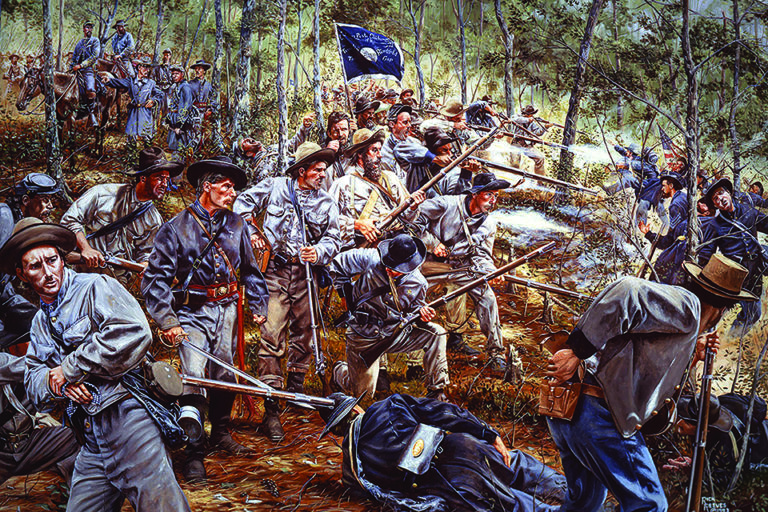

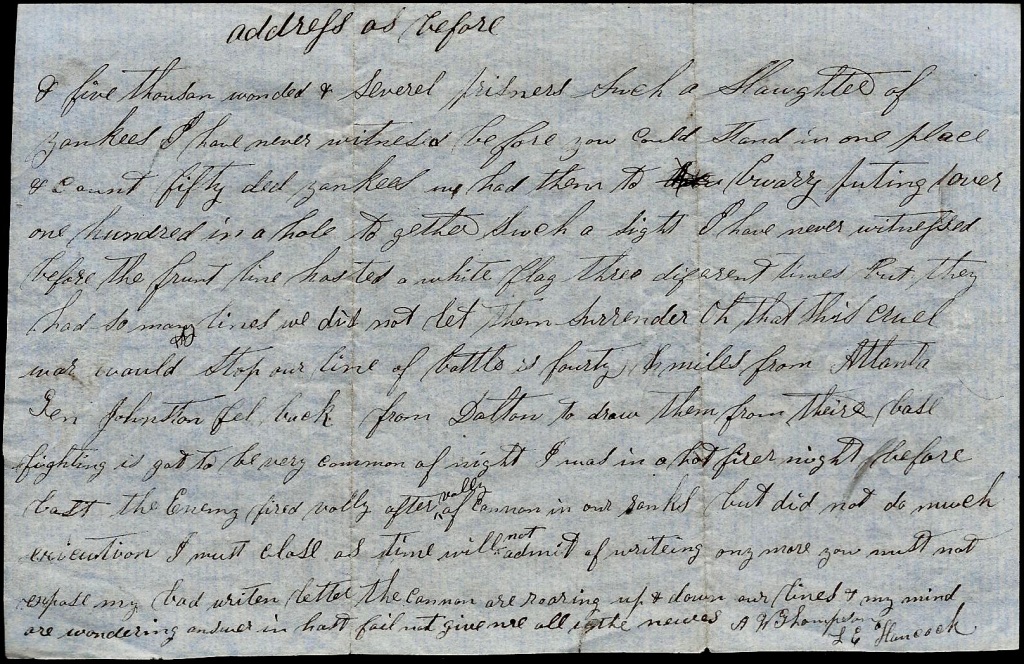
Letter 4
Camp line of Battle, 6th Arkansas Reg.
June 8th 1864
Dear Sister,
I assume my seat this afternoon to correspond to you the following. Yours of the 28th is at hand & its contents which I received on the 4th inst. Before I could get through reading your letter, I was called upon to go to the front as skirmishers to meet the advancing invader. Though I read your letter with great pleasure, it was filled with news to me. This short epistle leaves me well. I have nothing of definite importance to communicate to you. We are still in line of battle, some skirmishing going on every day and night on some part of our line. The enemy is still maneuvering for advantage of position but so far he has been promptly met. They are still throwing troops on our right but they do not find Gen. Johnston napping. They are trying to flank Johnston but met at ever point and successfully defeated.
Dear sister, we have been one month fighting and marching, changing our position to right, to left & right, to center, & left to center. The most of the time, day and night, we was marching or fighting. Some nights do not sleep any atall though the troops are in good spirits and confident of victory wherever they meet the invader.
I have just written a letter to Gilly Ann. Also one to Mr. Files of Hamburg. The letters will leave this evening by hand. Mr. Files is acquainted with Bro. J. Q. Files is Clerk of the Court of Ashley. I wrote to him for an answer. I am in hopes that Father’s finger will soon get well. Willy, I am glad to hear that you can feed Matchless. You must ride her to church when she gets large enough. Give Charley my address. Tell him to write to me. Also J. P. D. McLaurin is in this army. I saw him the other day. He thought that Bro. William carried his family to Texas and he did not know it to be so. Yours as ever, — A. W. Thompson
to H. F. Thompson

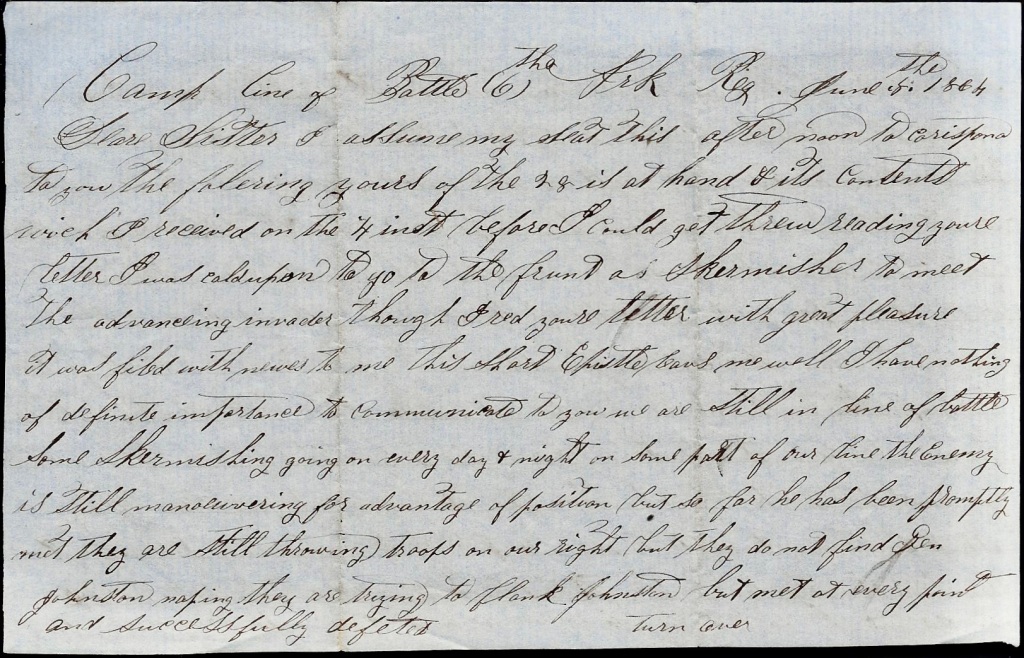
Letter 5
Line of Battle. 6th Arkansas Regt., Govan Brig.
June 16th 1864
Dear Sister,
Yours of the 3rd inst. is at hand which was read with pleasure. This short epistle leaves me well is the best news that I can communicate to you. I was sorry to hear that Father was sick. I am hopes that this will reach him enjoying health & pleasure. Dear sister, we are in line of battle and the enemy are in a half miles of our line of battle. Skirmishing are going on all the time, day and night. While I am writing the cannon are belching forth its war whoop from the invader in front of our lines.
We are waiting for the Yankees to advance on us which we expect them to do soon. It is thought they will advance today. They are maneuvering from the way they throw their shells.
I am sorry to inform you that Lt. General [Leonidas] Polk that commanded a Corps in this army was killed dead on the field yesterday. His left shoulder was torn off with a shell. He was killed on the right of my Division [at Pine Mountain].
I was sorry to hear the death of little Mary Watts but God giveth & God taketh away. He blessed us & five us a brave & noble general but he taketh him away and we are willing to give him up. They are so many old fields and roads I could not understand by your letter where Mary Watts was buried & I am not acquainted with Miley Sowell.
Our rations are not very plenty but we can make out on them. We get nothing but bread & meat. You must answer in haste. Give me all the news. Give Charley & J. P. my address & tell them to write to me. Give me the latest news from the 8th & 6th & 26th Regiments. If you do not get a letter every week from me, it is on account of the mail as it is not regular from here to the railroad. We are on the extreme left of our line of battle & that throws us fives miles from the railroad. Answered in haste. Fail not. — A. W. Thompson
The postage for the buttons was very high but buttons are very high & money is not worth much. Mother, you can give Aunt Wineford some of the buttons if she has any use for them as she is always making new pants. Farewell for awhile.
Address A. W. Thompson, Co. C, 6th Arkansas Reg., Govan’s Brigade, Cleburne’s Division, Army of the Tennessee, Marietta P. O., Georgia


Letter 6
Line of Battle, 6th Arkansas Reg.
June 23rd 1864
Dear Father & Mother,
Your kind letter of the 10th is at hand. I received it in due time. This leaves me well but wearied nearly out. We have been fighting very hard for the last two days. We are in full view of the enemy. They are in four hundred yards of our lines. Father, while I am writing, the balls are whistling all around me. The skirmishers are a few yards of our line of battle fighting. We are in our ditches & we have to stay in them day and night. My company have been skirmishing very hard for the last two days. The loss in my company for the last two days are one killed, four wounded, and one lost his right arm & several others struck with balls. I run some very narrow escapes but I thank God that I am one amongst the living yet.
You will see enclosed the Yankees account of their repulse on the 27th May [at Pickett’s Mill] but they was mistaken about the number of men we had engaged. Govan & Granbury Brig. was all that repulsed them. We had several wounded in the regiment & some few killed.
We are waiting for the Yankees to advance on our lines & when they do, we are confident of victory. It has been nearly two months since we left Dalton & we have been fighting & moving around from right to left, & falling back most the time, day and night. He have heavy rains every day and we have to take it as it comes.
Father, I cannot interest you as times is very hot around me with balls. You should be satisfied to hear that I am living. You must not expose my letters as I had to write in great haste & my mind are wandering. I get very little sleep at night. You must write in haste. Fail not. Give me all the news. Address as before. Yours as ever, — A. W. Thompson
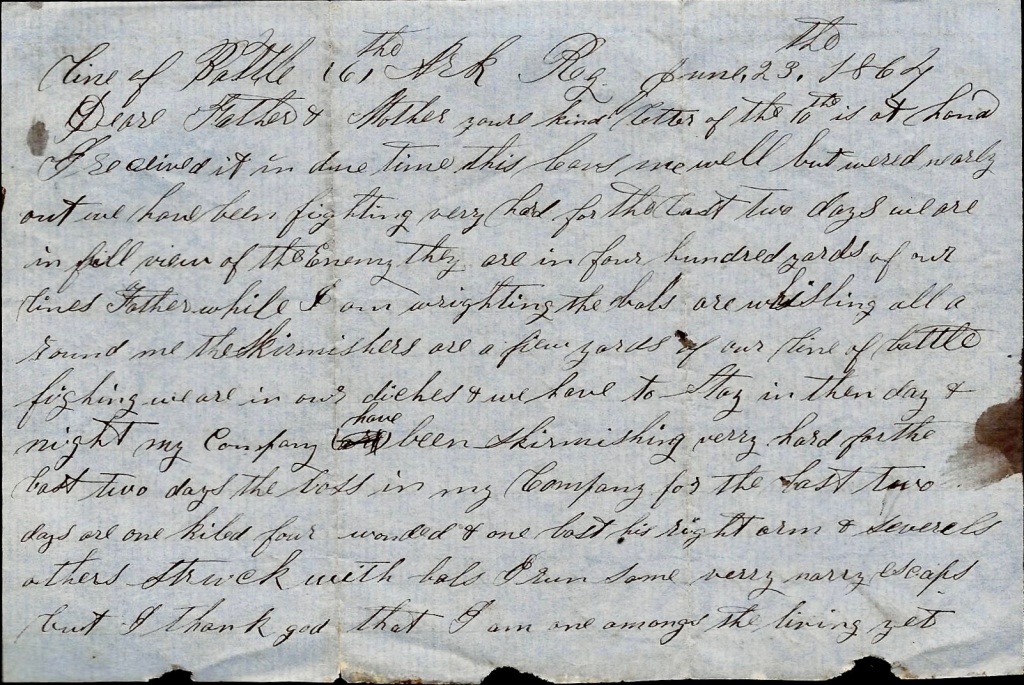

Letter 7
Line of Battle Ten Miles from Atlanta
July 7th 1864
Father & Mother
This short epistle will inform you that I received yours of the 25th in due time & was read with great pleasure. My health is very good except a bad cold & cough. My leg has been a great deal of pain to me for the last week.
Father, we are [with]in ten miles of Atlanta. The two armies are close fronting each other. I have had some fighting to do since the date of my last letter. I spent the fourth of July on the skirmishing line and the Yankees advanced ]with]in seventy-five feet of our line when they received a brisk fire from our lines which made them skedaddle back. I ran a very narrow escape. We was behind very inferior works of old rails & some dirt thrown on them when a ball passed through them with full force, passing so near my head that I did not know which side it went.
Father, I was struck the other day side of my head right in my left ear but being a spent ball, it did not hurt me very bad. Had one ball shot threw my oil-cloth, wounding me, [and then] wounding a member of my company in the leg. Father I feel that GOD is with me. If not, I could not be able to pen out this letter to you knowing what I went through since I left Dalton.
The casualties of my company since we left Dalton is three killed, six wounded, one lost his right arm. Mother, I often think of your table. Our rations are bacon & cornbread. We have to fry it in our plates. I have got so I cannot eat it fried any longer. I boil some in my cup and eat but I am getting very puny as I cannot change my diet, the soldiers are using pea vines, parsley, kernels of wheat, briar leaves & many other weeds for salad. My company uses the above named for salad. The boys are nearly starved out for vegetables but they are like me, cannot help themselves. Answer in haste. Give me all the news from JP & CS. Let them hear from me. I have not time to write to them as there is fighting all the time on our front. — A. W. Thompson
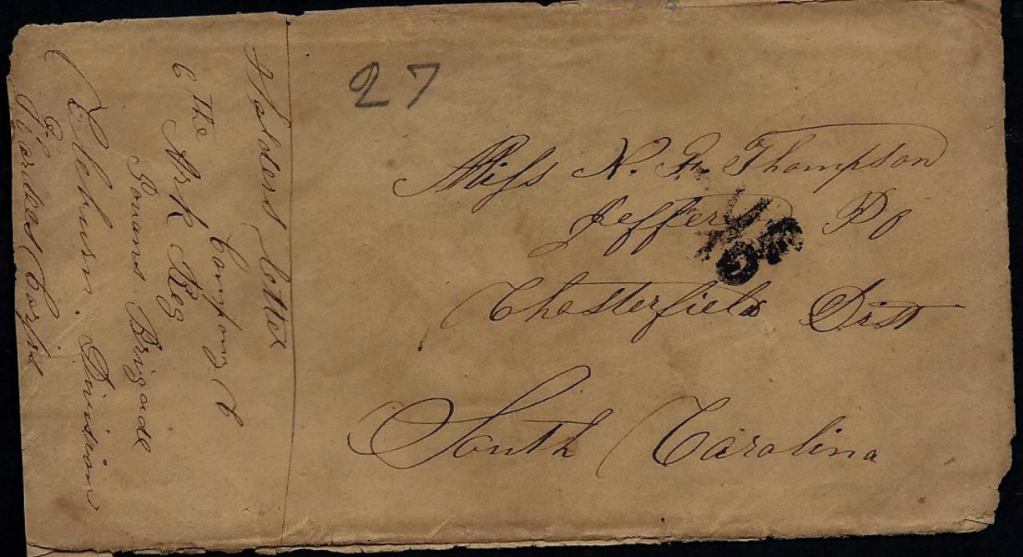
Letter 8
Line of Battle in Front of Atlanta
July 15th, 1864
Dear Sister,
I received your benevolent and favorable letter of the 1st & the 2nd in due time. It was received with great pleasure. I have no news to communicate to you that will interest you—only that I am well. Hoping you may receive this short epistle enjoying health and pleasure.
We are [with]in four miles of Atlanta. The Yankees are fronting our line of battle but have not advanced any for several days. They know that General Johnston will not retreat any further & they are come to a halt. When they try to advance on Atlanta the bloodiest battle of the war will take place. Most of the citizens have left the city. The soldiers are in good spirits & we all think that Johnston will hold Atlanta. Gen. Bragg arrived here yesterday from Richmond.
You spoke something about the apples getting ripe. It would be a great pleasure to me if I could spend one week at home to get some fruit and vegetables though I would be satisfied if I could get a few onions to eat with my bacon, but alas I will have to do the best I can during the war. I should be satisfied that I am living. I am in hopes that Charles Norton’s wound is slight when you get the correct news, for I would be very sorry to hear of his death. Let me hear from John and Henry Knight also from the 6th, 8th, & the 26 Regiments.
I got a mess of Irish potatoes the other day which pleased me, the best of anything I have met up with in several days. Onions are selling at one dollar a pound and they are very scarce. It is the most impossible to get any vegetables about the army. I must close, answer in haste, fail not, give me all the news as all you write to me interests me. — A. W. Thompson
Letter 9
On August 11, 1864, Thompson’s father was sent a two page letter from Griffin, Georgia, from a volunteer Army missionary imparting grave news regarding the condition of his son.
Griffin, Georgia
Aug 11 1864
Dear Sir:
I drop you these lines to inform you of the condition of your son, A. W. Thompson, Co. C, 6th Ark. Regiment. He was wounded on the 22nd July in the left arm. It was broken just above the elbow and is now at the S. P. Moore Hospital in this place. He is very anxious to see you. He begged me to write to you which I do with pleasure. To be candid I cannot think from what the Dr. told me that your son will survive unless a change in his present condition. He was thought to be doing well till yesterday but since then he is growing weaker. I will write you in a day or so again & will telegraph you tomorrow or next day how your son is doing.
In the meantime I hope you will be submissive to the will of Providence—whatever that may be. We are doing all for him that can be done & the ladies are untiring in their attentions to the soldier’s wants. I remain respectfully yours, — Wm. H. Pearson, Missionary to the Army
